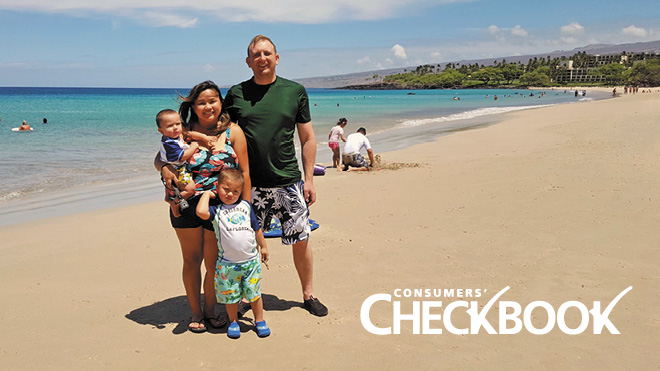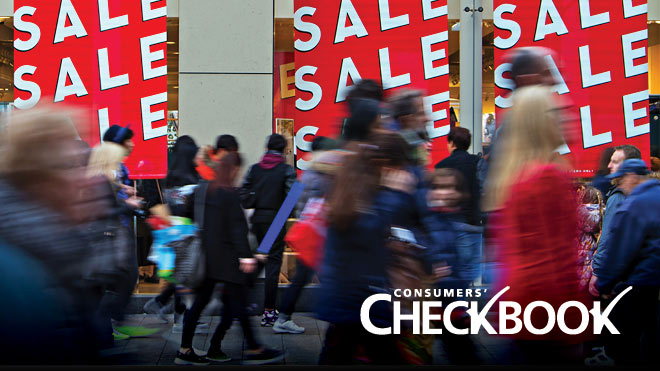
7 Ways To Spend Less on Holiday Shopping
Give great gifts this holiday season without breaking the bank with these tips from our partners at Consumers' Checkbook.
For many people, the season of shopping has arrived. Some look forward to this annual tradition while others grumble at the very thought of scouring the internet or trekking to a mall or big box store to find the perfect gift — or any gift. Whether shopping brings you joy or pain, here is a roundup of our top tips for saving money and avoiding hassles this holiday season.
1. Beware of Sales and Discounts
Consumers' Checkbook's researchers spent 33 weeks tracking sale prices at 25 major retailers and found that stores' sales and discounts often aren't really deals at all. Retailers advertised sale prices and discounts that never end.
Even if a retailer promises savings of 60% or more, it could be a marketing gimmick, not a genuine discount — and likely not the lowest available price. Try to leave yourself time to shop around so you can make sure you're not overpaying.
There are dozens of smartphone apps and websites that can help you shop for the lowest prices quickly, including PayPal Honey, PriceGrabber, ShopSavvy and Yahoo Shopping. Amazon's price-checking tool is integrated into its mobile app. CamelCamelCamel, which tracks price histories of items sold by Amazon for the past year, is also helpful with identifying how low an item's price might go on that site.
2. Search for Promo Codes
When making purchases online, you'll often see spaces where you can enter a promotion or coupon code. These spaces may as well be labeled, "Hey! Here's free money!" Do an internet search for discount codes for the site (for example, search for "Lands' End discount code"). There are several websites that try to track these deals. Check out CouponCabin, RetailMeNot, and SlickDeals.
Sometimes you'll only find expired deals or false leads, but the few minutes of effort is worth the potential savings. Consumers' Checkbook recently used codes to score a 35% discount at Old Navy, saved 40% on a photo order from Shutterfly, and locked in 25% off sheets and towels at Brooklinen. And many sites will let you stack coupons for even greater savings or free shipping.
3. Try Cash-Back Shopping Portals
Many online retailers pay referral commissions to businesses that send them customers. Online shopping portals, including BeFrugal, CouponCabin, Rakuten, and MrRebates give their customers a cut of those funds (anywhere from 1% to 40% of the shopper's total purchase amount). For example, Checkbook recently found 12% cash-back at Adidas and 8% cash-back at Banana Republic. Especially when combined with the store's coupons, that extra money can make a significant difference in your total spending.
You must click through to the retailer's website via the portal's website (or install the portal's browser extension, which most of them offer, to connect automatically). Most portals let you simplify things — and remind you of available rebates — with the extensions and mobile apps that tell you when there's cash back available as you visit websites.
A feature of one cash-back service is that they keep track of stores' promo and coupon codes and automatically apply those discounts as you add items to your cart. Sometimes one portal will offer a better rebate than others. Before making a big buy, check with CashbackMonitor, which aggregates offers for various rebate sites and reports the best current payouts.
4. Keep an Eye on Your Snail Mail
It may seem passé, but many retailers still send paper catalogs and coupons. The trick is to avoid temptation for things you don't need and only save the ones you know jibe with your shopping list
5. Ask for a Price Match
If you're shopping in-store, and find a lower price elsewhere, ask a salesperson or cashier for a price match.
6. Watch for Price Adjustments After You Buy
Keep an eye on retailers' sites for a couple weeks after you've shopped to see if prices have dropped. Many stores will refund the difference. Check policies on websites. Some stores offer an adjustment within seven days of purchase, some 30 days or longer.
For example, Target has announced an extended price adjustment window for the 2023 holiday season: Oct. 22 until Dec. 24.
7. Consider Gift Cards and Experience Gifts
Most of us have too much stuff. You can avoid gifting potentially unwanted items — and eliminate the pressure of shopping during the crazy holiday shopping season — by buying gift cards and experience gifts (yoga passes, cooking classes, hotel or airline gift cards, massages, museum memberships). Services you can provide also make wonderful presents (for example, a coupon for babysitting or a homemade meal). Want to make the gift feel extra special, even if it's a certificate or card? Wrap it beautifully, and possibly include a small, practical item to go with it, such as tennis balls to go with a certificate for lessons.
Beware of Scams
If prices seem too good to be true, they probably are. Scammers love to lure shoppers via text and email with offers on hot and tough-to-get items. Do your homework before buying from third-party sellers on large sites like Amazon, Facebook and Walmart. They sometimes make returns difficult, and sometimes products never arrive.
Spot a great deal? Make sure the seller has tons of positive reviews and check for complaints on file with the Better Business Bureau.
About Consumers' Checkbook
Puget Sound Consumers' Checkbook and Checkbook.org are a nonprofit organization with a mission to educate and help consumers. Checkbook also evaluates local service providers — home improvement contractors, doctors, dentists, veterinarians, stores and more. It is supported by consumers and takes no money from the companies it evaluates. BECU members can try Consumers' Checkbook for 30 days for free and can get 50% off their annual subscription.
BECU does not accept liability for Consumers' Checkbook and does not endorse nor accept liability for the use of businesses, products, or services listed on their site. Any information provided by BECU regarding Consumers' Checkbook is provided without any representation, guaranty, or warranty as to its accuracy, quality, or completeness.
The above article is intended to provide generalized financial information designed to educate a broad segment of the public; it does not give personalized financial, tax, investment, legal, or other business and professional advice. Before taking any action, you should always seek the assistance of a professional who knows your particular situation when making financial, legal, tax, investment, or any other business and professional decisions that affect you and/or your business.
Related Content
BECU does not accept liability for Consumers' Checkbook and does not endorse nor accept liability for the use of businesses, products, or services listed on their site. Any information provided by BECU regarding Consumers' Checkbook is provided without any representation, guaranty, or warranty as to its accuracy, quality, or completeness.


